-
Product Name
GPS1 Polyclonal Antibody
- Documents
-
Description
Polyclonal antibody to GPS1
-
Tested applications
WB, IHC, IF
-
Species reactivity
Human, Mouse, Rat
-
Alternative names
GPS1 antibody; COPS1 antibody; CSN1 antibody; SGN1 antibody; G protein pathway suppressor 1 antibody
-
Isotype
Rabbit IgG
-
Preparation
Antigen: Recombinant fusion protein containing a sequence corresponding to amino acids 258-527 of human GPS1 (NP_997657.1).
-
Clonality
Polyclonal
-
Formulation
PBS with 0.02% sodium azide, 50% glycerol, pH7.3.
-
Storage instructions
Store at -20℃. Avoid freeze / thaw cycles.
-
Applications
WB 1:500 - 1:2000
IHC 1:50 - 1:200
IF 1:50 - 1:100 -
Validations
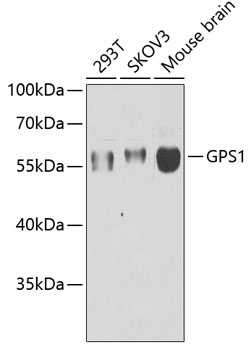
Western blot - GPS1 Polyclonal Antibody
Western blot analysis of extracts of various cell lines, using GPS1 antibody at 1:1000 dilution.Secondary antibody: HRP Goat Anti-Rabbit IgG (H+L) at 1:10000 dilution.Lysates/proteins: 25ug per lane.Blocking buffer: 3% nonfat dry milk in TBST.Detection: ECL Enhanced Kit .Exposure time: 90s.
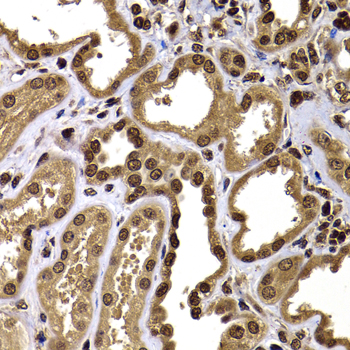
Immunohistochemistry - GPS1 Polyclonal Antibody
Immunohistochemistry of paraffin-embedded human kidney using GPS1 antibody at dilution of 1:100 (40x lens).
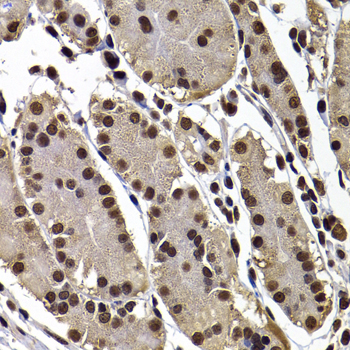
Immunohistochemistry - GPS1 Polyclonal Antibody
Immunohistochemistry of paraffin-embedded human stomach using GPS1 antibody at dilution of 1:100 (40x lens).
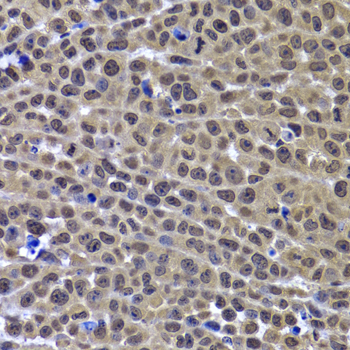
Immunohistochemistry - GPS1 Polyclonal Antibody
Immunohistochemistry of paraffin-embedded mouse cancer using GPS1 antibody at dilution of 1:100 (40x lens).
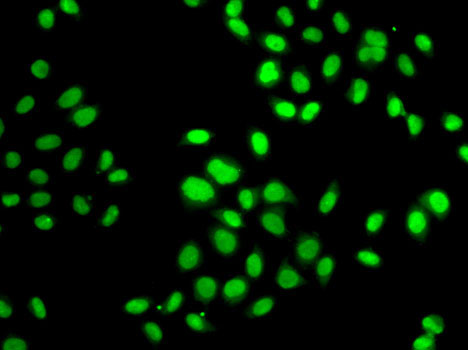
Immunofluorescence - GPS1 Polyclonal Antibody
Immunofluorescence analysis of MCF7 cells using GPS1 antibody .
-
Background
Essential component of the COP9 signalosome complex (CSN), a complex involved in various cellular and developmental processes. The CSN complex is an essential regulator of the ubiquitin (Ubl) conjugation pathway by mediating the deneddylation of the cullin subunits of SCF-type E3 ligase complexes, leading to decrease the Ubl ligase activity of SCF-type complexes such as SCF, CSA or DDB2. The complex is also involved in phosphorylation of p53/TP53, c-jun/JUN, IkappaBalpha/NFKBIA, ITPK1 and IRF8/ICSBP, possibly via its association with CK2 and PKD kinases. CSN-dependent phosphorylation of TP53 and JUN promotes and protects degradation by the Ubl system, respectively. Suppresses G-protein- and mitogen-activated protein kinase-mediated signal transduction.
Related Products / Services
Please note: All products are "FOR RESEARCH USE ONLY AND ARE NOT INTENDED FOR DIAGNOSTIC OR THERAPEUTIC USE"
